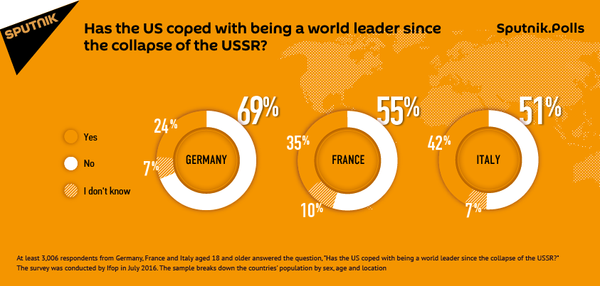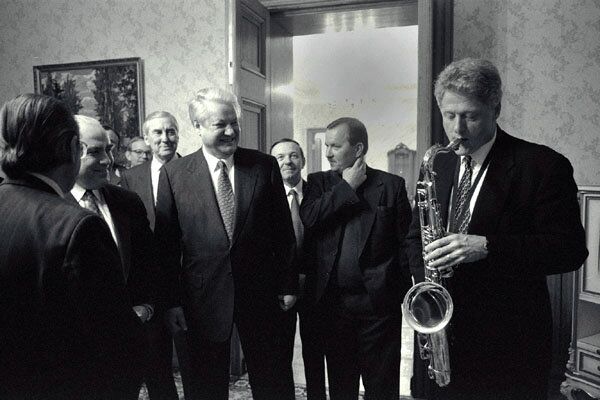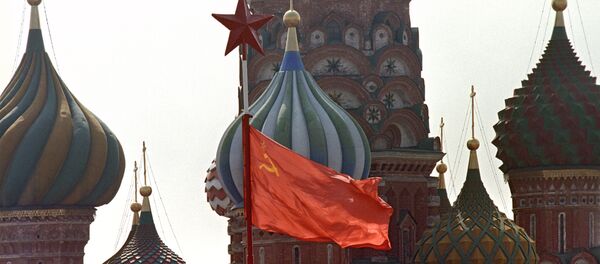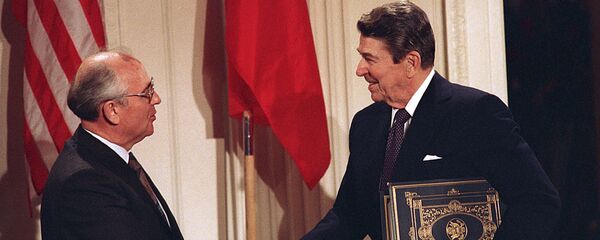The latest Sputnik.Polls survey has indicated that the majority of people in Germany (69%), France (55%) and Italy (51%) believe that the United States failed to become a world leader following the collapse of the Soviet Union back in 1991.
What lies behind the negative sentiment?
Speaking to Sputnik Spanish, Pere Ortega, Director of Study Centre for Peace J.M. Delàs (Centro Delàs de Estudios por la Paz), underscored that after assuming the role of sole superpower the US rushed to boost its geopolitical posture instead of serving as a guarantor of peace.
"The United States, which turned into a sole superpower after the collapse of the Soviet Union, used its position to strengthen its power on a global scale, instead of serving as a guarantor of UN principles," Ortega told Sputnik.
Ortega pointed out that the USSR's collapse untied Washington's hands, so that it could do whatever it wanted in the Middle East without regard to Moscow. As a result, the United States has set Afghanistan, Iraq and Libya on fire.
"The invasion of Afghanistan and Iraq, the overthrow of the government in Libya are but a few examples of Washington's actions which led to instability in North Africa and the Middle East. Today the region is flooded with terrorist groups which have emerged because of policies conducted by Washington, while the latter has no idea how to fix the situation it created," Ortega highlighted.

Turkish political analyst Mehmet Ali Guller echoes Ortega.
According to Guller, the US signaled its bid to become a sole superpower when the Soviet Union was falling apart at the seams and the Pentagon was conducting Operation Desert Shield in the Persian Gulf.
However, the necessary preconditions for American hegemony had not been created, the Turkish analyst told Sputnik Turkiye.
The idea of America's "world leadership" had been relevant only between 1991 and 2004; in this short 13-year period of time the United States had made a real attempt to become a global hegemon, Guller noted.
"But the world quickly overcame this stage, and entered into a new period — a multi-polar [phase], in which globalization has given way to regionalization," the Turkish analyst emphasized.
"The US' attempts to become a world leader were stopped by three events: the invasion of Iraq in 2004; Hezbollah's resistance to Israel in 2006; and the conflict in Georgia [South Ossetia] in 2008. These three events thwarted America's plans to become a world leader and spread its influence worldwide," Guller pointed out.
"This is how the attempt to turn the 21st century into an era of America's global domination failed," he underscored.
The experts called attention to the fact that the world is becoming increasingly multi-polar with new centers of power emerging in Europe, Asia and Latin America.
But these are not the only reasons for America's decline as a sole superpower.
According to Jeffrey D. Sachs, an American economist and director of The Earth Institute at Columbia University, what America suffers from is "imperial overreach."

"The end of the Cold War, in 1991, should have been the occasion for a fundamental reorientation of US guns-versus-butter policies… Alas, the blinders and arrogance of American imperial thinking prevented the United States from settling down to a new era of peace. As the Cold War was ending, the United States was beginning a new era of wars," Sachs wrote in his October article for The Boston Globe.
Over the last 25 years the US has wasted vast sums of American taxpayers' money and undermined its security, the US economist stressed.
The US is following in the USSR's footsteps, Sachs warned.
"The Soviet Union bankrupted itself through costly foreign adventures such as the 1979 invasion of Afghanistan and its vast over-investment in the military," he recalled.
According to Ortega, US President-elect Donald Trump is likely to bring an end to this dangerous trend: Trump is not obsessed with the idea of the US' global dominance and has no appetite for pumping money into NATO.
"Thus, we can say that the United States as the sole superpower did not bring stability to the world. And this is one of the reasons why the world is moving towards multi-polarity," Ortega concluded.
The Sputnik.Polls survey was conducted by the oldest public polling company in France, Ifop, in July 2016. In all, 3,006 people over 18 countries such as France, Germany and Italy were polled. The data selection represents the population by gender, age and location. The margin of error for the data per country is +/- 3.1% at a confidence level of 95%.






